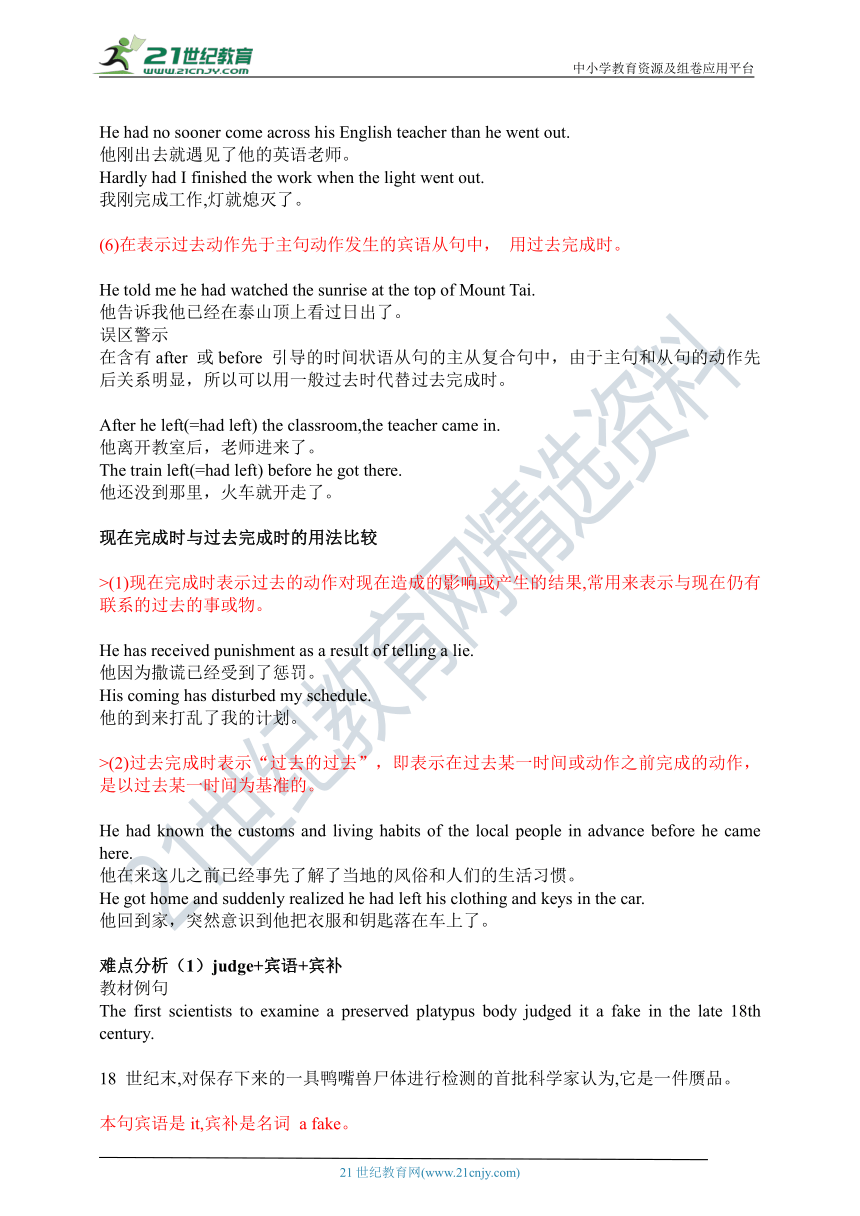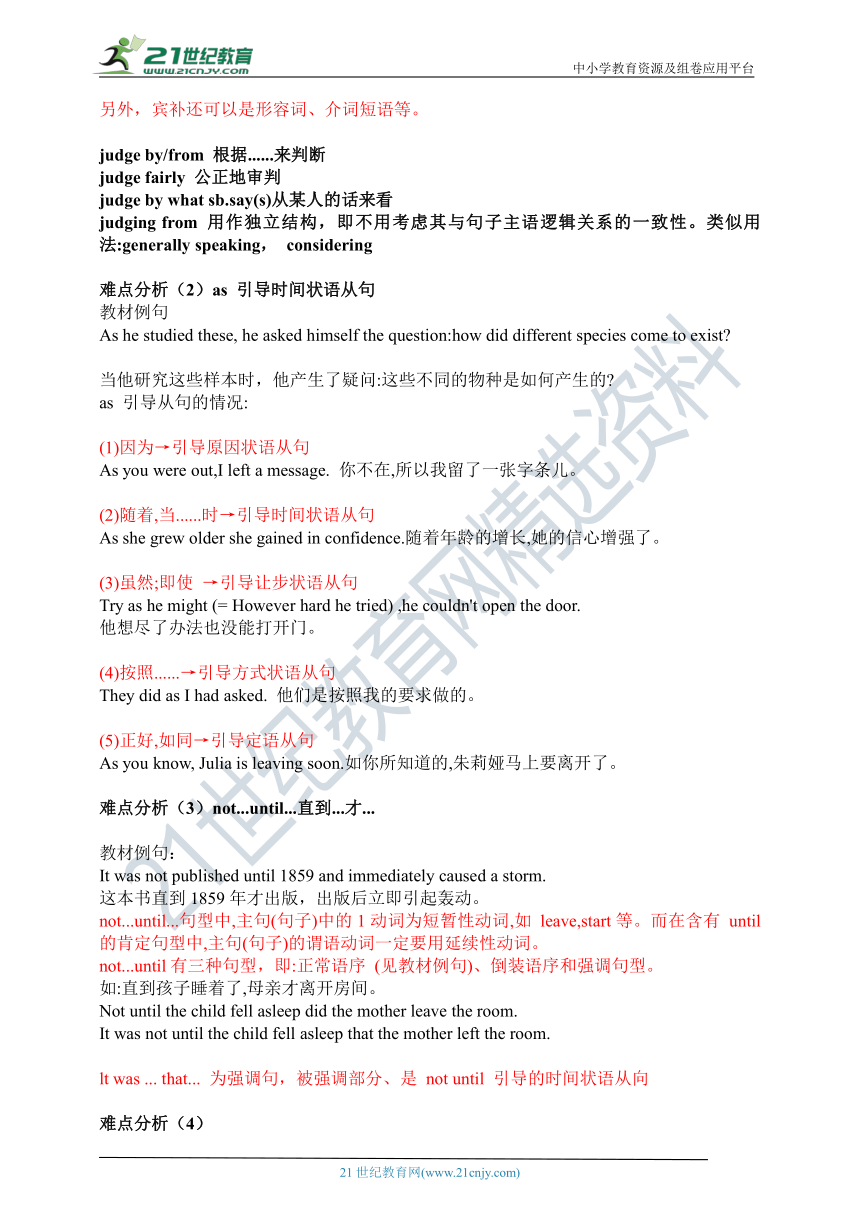(2019外研版)选修一unit 5 Revealing nature 讲义
文档属性
| 名称 | (2019外研版)选修一unit 5 Revealing nature 讲义 |

|
|
| 格式 | zip | ||
| 文件大小 | 1.2MB | ||
| 资源类型 | 试卷 | ||
| 版本资源 | 外研版(2019) | ||
| 科目 | 英语 | ||
| 更新时间 | 2022-03-10 00:00:00 | ||
图片预览



文档简介
中小学教育资源及组卷应用平台
Module Five 过去完成时及难点分析
●过去完成时·
过去完成时的构成
肯定句:主语 +had +done...
否定句:主语 +had not + done...一般疑问句:Had+主语+done...
特殊疑问句:疑问词+had+主语 +done...
He had already known the contents of the document before I told him.
在我告诉他之前,他早已知道了文件的内容。
We hadn't learned 2,000 words by the end of last term.
到上学期末,我们还没有学到2000 个单词。
Had Jane left before I arrived 我到达之前简就离开了吗
What had you done before I arrived here 我来这儿之前,你们做了什么
过去完成时的用法
>(1)表示在过去某个动作或时间之前已经发生或完成的动作,即“过去的过去”,常与 by,before 等引导的时间状语连用。
When the explorer hurried to the destination ,the others had already left.
当这名探险家匆忙赶到目的地的时候,其他人已经离开了。
.The captain had checked all the equipment before the ship set sail.
在轮船起航前,船长已经检查了所有的设备。
·They had constructed a new bridge in the valley by the end of last month.
到上个月末,他们已经在山谷里修建了一座新桥。
>(2)表示从过去某一时间开始,延续到过去另一时间的动作,常与 for,since 引导的时间状语连用。
He told us that he had done the scientific research for five years.
他告诉我们他做科研工作已经5年了。
He said he had made great progress since he came here
他说自从他来这里之后已经取得了很大的进步。
>(3)表示过去未实现的计划或愿望,常用动词有 hope, expect,suppose,think,want,intend,mean,plan 等。
I had never thought that you were willing to help me.
我未想过你愿意帮我。
He had wanted to help you but he had no time then.
他本想帮助你的,但当时没有时间。
>(4)用于“It was the first/second.... time that.."
"It was+一段时间+since从句‘等句型中,从句用过去完成时。
It was the first time that he had organized such an adventure trip.
这是他第一次组织这样的冒险旅行。
lt was five months since he had returned.
他回来已经 5 个月了。
(5)在 hardly/scarcely...when... 和 no sooner..than...等 结构中,主句一般使用过去完成时。
He had no sooner come across his English teacher than he went out.
他刚出去就遇见了他的英语老师。
Hardly had I finished the work when the light went out.
我刚完成工作,灯就熄灭了。
(6)在表示过去动作先于主句动作发生的宾语从句中, 用过去完成时。
He told me he had watched the sunrise at the top of Mount Tai.
他告诉我他已经在泰山顶上看过日出了。
误区警示
在含有after 或before 引导的时间状语从句的主从复合句中,由于主句和从句的动作先后关系明显,所以可以用一般过去时代替过去完成时。
After he left(=had left) the classroom,the teacher came in.
他离开教室后,老师进来了。
The train left(=had left) before he got there.
他还没到那里,火车就开走了。
现在完成时与过去完成时的用法比较
>(1)现在完成时表示过去的动作对现在造成的影响或产生的结果,常用来表示与现在仍有联系的过去的事或物。
He has received punishment as a result of telling a lie.
他因为撒谎已经受到了惩罚。
His coming has disturbed my schedule.
他的到来打乱了我的计划。
>(2)过去完成时表示“过去的过去”,即表示在过去某一时间或动作之前完成的动作,是以过去某一时间为基准的。
He had known the customs and living habits of the local people in advance before he came here.
他在来这儿之前已经事先了解了当地的风俗和人们的生活习惯。
He got home and suddenly realized he had left his clothing and keys in the car.
他回到家,突然意识到他把衣服和钥匙落在车上了。
难点分析(1)judge+宾语+宾补
教材例句
The first scientists to examine a preserved platypus body judged it a fake in the late 18th century.
18 世纪末,对保存下来的一具鸭嘴兽尸体进行检测的首批科学家认为,它是一件赝品。
本句宾语是it,宾补是名词 a fake。
另外,宾补还可以是形容词、介词短语等。
judge by/from 根据......来判断
judge fairly 公正地审判
judge by what sb.say(s)从某人的话来看
judging from 用作独立结构,即不用考虑其与句子主语逻辑关系的一致性。类似用法:generally speaking, considering
难点分析(2)as 引导时间状语从句
教材例句
As he studied these, he asked himself the question:how did different species come to exist
当他研究这些样本时,他产生了疑问:这些不同的物种是如何产生的
as 引导从句的情况:
(1)因为→引导原因状语从句
As you were out,I left a message. 你不在,所以我留了一张字条儿。
(2)随着,当......时→引导时间状语从句
As she grew older she gained in confidence.随着年龄的增长,她的信心增强了。
(3)虽然;即使 →引导让步状语从句
Try as he might (= However hard he tried) ,he couldn't open the door.
他想尽了办法也没能打开门。
(4)按照......→引导方式状语从句
They did as I had asked. 他们是按照我的要求做的。
(5)正好,如同→引导定语从句
As you know, Julia is leaving soon.如你所知道的,朱莉娅马上要离开了。
难点分析(3)not...until...直到...才...
教材例句:
It was not published until 1859 and immediately caused a storm.
这本书直到1859年才出版,出版后立即引起轰动。
not...until...句型中,主句(句子)中的1动词为短暂性动词,如 leave,start等。而在含有 until 的肯定句型中,主句(句子)的谓语动词一定要用延续性动词。
not...until有三种句型,即:正常语序 (见教材例句)、倒装语序和强调句型。
如:直到孩子睡着了,母亲才离开房间。
Not until the child fell asleep did the mother leave the room.
It was not until the child fell asleep that the mother left the room.
lt was ... that... 为强调句,被强调部分、是 not until 引导的时间状语从向
难点分析(4)
主语+is + adj. + to do(不定式用主动形式表示被动意义 )主语是......的。
教材例句:
Gregor Mendel chose to study pea plants because their characteristics were easy to control 。
格雷戈尔·孟德尔选择研究豌豆是因为它们的特性易于控制。
“主语+be+性质形容词+to do”句式
中,主语与不定式之间是被动关系,不定式用主动形式表示被动意义。此句式可以转换成“It be + adj.+ to do
He is hard to work with.= It is hard to work with him同他共事很难。
常用于这个句式的形容词有 easy,
difficult,hard,important,necessary, possible,pleasant,heavy,impossible 等。
难点分析(5)
Sb.was said to have done sth.据说某人已经做了某事
教材例句
Alexander the Great and Marco Polo were said to have visited such a tree in India.
据说亚历山大大帝和马可·波罗曾在印度见过一棵会说话的树。
It is said that...
Sb./Sth.is said to do...
Sb./Sth.is said to be doing...
Sb./Sth.is said to have done...
不定式有时态和语态的变化
It+be+过去分词 +that...
It is agreed that... 人们同意......
It is announced that... 据宣布......
It is believed that... 人们相信......
It is considered that... 人们认为......
It is hoped that... 人们希望......
It is reported that... 据报道......
It is recorded that... 据记载......
It is suggested that... 有人建议......
It is thought that... 人们认为.....
该类句式中,it是形式主语,that 引导的从句是真正的主语。
1.People say that he has moved to Chicago.
= It's said that he has moved to Chicago.
= He is said to have moved to Chicago.
人们说/据说他已经搬到芝加哥了。
2.He is said to be studying in Australia as an exchange student.
据说他作为交换生正在澳大利亚学习。
3 The late musician Dennis Brian is said to have asked a fellow train passenger to turn off his radio.
据说已故的音乐家丹尼斯·布莱恩要求火车上的一位乘客关掉他的收音机。
难点分析(6)
It has been known for some time that...
(it作形式主语,that引导的从句是真正的主语)
教材例句
It has been known for some time that plants use chemicals to communicate with each other.
人们早就知道植物可以利用化学物质进行交流。
本句式中,it 作形式主语,that 从句是真正的主语。that 在从句中仅起连接作用,不作句子成分,也无实际意义。
It+be+过去分词(said,reported,thought,expected,decided,announced,arranged,etc.)+that 从句.此类句式可以进行转换:
It is said that body language accounts for55 per cent of a first impression while what you say just 7 per cent.
= Body language is said to account for 55 per cent of a first impression while what you say just7 per cent.
据说肢体语言占第一印象的 55%,面你说的话只占 7%。
难点分析(7)
so that 引导目的状语从句
教材例句
Scientists hope to learn more about this plant warning system,so that we can use it to grow crops without pesticides.
科学家希望能进一步了解这种植物警报系统从而将其应用于不用使用农药的农作物的种植。
so that 既可以引导目的状语从句,此时相当于 in order that,从句中往往有 will,would,can,could,may,might 等情态动词,表明动作尚未发生,还可以引导结果状语从句,从句动作往往已经发生。
They trained hard every day so that they could win glory for their homeland.
他们每天努力训练,为的是给他们的祖国赢得荣誉。(目的)
Their niece was spoiled so that she became more and more naughty.
他们的侄女被宠坏了,结果她变得越来越调皮。(结果)
拓 so...that...“如此......以至于......”,so为副词,后跟形容词或副词。
难点分析(8)
现在分词短语作方式状语
教材例句
Using the wood wide web, plants can share information and even food with each other.
利用这个植物万维网,植物可以互相分享信息甚至是食物
using the wood wide web 是现在分词短语,作方式状语。
现在分词(短语)作时间、原因、条件状语时,通常位于句首;作结果、方
式、伴随状语时,通常位于句末。
Working as a volunteer teacher in the west,the girl took up growing vegetables.
西部地区当志愿老师时,这个女孩对种菜产生了兴趣。(时间状语)
Seeing that his wife was going off to sleep,he switched off the TV.
看到他的妻子要离开去睡觉,他关掉了电视。(原因状语)
She tried a new diet, reducing her weight .
她尝试了一种新的饮食,结果体重减轻了。(结果状语)
He sat there for two hours,considering how to design the advertisement.
他在那里坐了两个小时,考虑着如何设计这则广告。
(伴随状语)
本单元重点词组
1.answer the call 响应号召
2.first choice 第一选择,首选
3.be crowded with 挤满,堆满
4.a variety of 各种各样的
5.be a disgrace 是耻辱,是丢脸的事
6.of all time 一直,始终
7.come to exist 开始存在
8.tiny amounts of 少量的......
9.be native to 源于......的,原产于.....
10.in question 讨论中的;考虑中的
11.adapt to 适应
12.drive...away 把......赶走
13.date back to 起源于;追溯到(=date from)
14.be harmful to (=do harm to) 对...有害
15.be home to(=be the home of=be native to)是...的栖息地/家园
16.carry out 进行;实行;执行
17.in some ways 在某些方面
21世纪教育网 www.21cnjy.com 精品试卷·第 2 页 (共 2 页)
HYPERLINK "http://21世纪教育网(www.21cnjy.com)
" 21世纪教育网(www.21cnjy.com)
Module Five 过去完成时及难点分析
●过去完成时·
过去完成时的构成
肯定句:主语 +had +done...
否定句:主语 +had not + done...一般疑问句:Had+主语+done...
特殊疑问句:疑问词+had+主语 +done...
He had already known the contents of the document before I told him.
在我告诉他之前,他早已知道了文件的内容。
We hadn't learned 2,000 words by the end of last term.
到上学期末,我们还没有学到2000 个单词。
Had Jane left before I arrived 我到达之前简就离开了吗
What had you done before I arrived here 我来这儿之前,你们做了什么
过去完成时的用法
>(1)表示在过去某个动作或时间之前已经发生或完成的动作,即“过去的过去”,常与 by,before 等引导的时间状语连用。
When the explorer hurried to the destination ,the others had already left.
当这名探险家匆忙赶到目的地的时候,其他人已经离开了。
.The captain had checked all the equipment before the ship set sail.
在轮船起航前,船长已经检查了所有的设备。
·They had constructed a new bridge in the valley by the end of last month.
到上个月末,他们已经在山谷里修建了一座新桥。
>(2)表示从过去某一时间开始,延续到过去另一时间的动作,常与 for,since 引导的时间状语连用。
He told us that he had done the scientific research for five years.
他告诉我们他做科研工作已经5年了。
He said he had made great progress since he came here
他说自从他来这里之后已经取得了很大的进步。
>(3)表示过去未实现的计划或愿望,常用动词有 hope, expect,suppose,think,want,intend,mean,plan 等。
I had never thought that you were willing to help me.
我未想过你愿意帮我。
He had wanted to help you but he had no time then.
他本想帮助你的,但当时没有时间。
>(4)用于“It was the first/second.... time that.."
"It was+一段时间+since从句‘等句型中,从句用过去完成时。
It was the first time that he had organized such an adventure trip.
这是他第一次组织这样的冒险旅行。
lt was five months since he had returned.
他回来已经 5 个月了。
(5)在 hardly/scarcely...when... 和 no sooner..than...等 结构中,主句一般使用过去完成时。
He had no sooner come across his English teacher than he went out.
他刚出去就遇见了他的英语老师。
Hardly had I finished the work when the light went out.
我刚完成工作,灯就熄灭了。
(6)在表示过去动作先于主句动作发生的宾语从句中, 用过去完成时。
He told me he had watched the sunrise at the top of Mount Tai.
他告诉我他已经在泰山顶上看过日出了。
误区警示
在含有after 或before 引导的时间状语从句的主从复合句中,由于主句和从句的动作先后关系明显,所以可以用一般过去时代替过去完成时。
After he left(=had left) the classroom,the teacher came in.
他离开教室后,老师进来了。
The train left(=had left) before he got there.
他还没到那里,火车就开走了。
现在完成时与过去完成时的用法比较
>(1)现在完成时表示过去的动作对现在造成的影响或产生的结果,常用来表示与现在仍有联系的过去的事或物。
He has received punishment as a result of telling a lie.
他因为撒谎已经受到了惩罚。
His coming has disturbed my schedule.
他的到来打乱了我的计划。
>(2)过去完成时表示“过去的过去”,即表示在过去某一时间或动作之前完成的动作,是以过去某一时间为基准的。
He had known the customs and living habits of the local people in advance before he came here.
他在来这儿之前已经事先了解了当地的风俗和人们的生活习惯。
He got home and suddenly realized he had left his clothing and keys in the car.
他回到家,突然意识到他把衣服和钥匙落在车上了。
难点分析(1)judge+宾语+宾补
教材例句
The first scientists to examine a preserved platypus body judged it a fake in the late 18th century.
18 世纪末,对保存下来的一具鸭嘴兽尸体进行检测的首批科学家认为,它是一件赝品。
本句宾语是it,宾补是名词 a fake。
另外,宾补还可以是形容词、介词短语等。
judge by/from 根据......来判断
judge fairly 公正地审判
judge by what sb.say(s)从某人的话来看
judging from 用作独立结构,即不用考虑其与句子主语逻辑关系的一致性。类似用法:generally speaking, considering
难点分析(2)as 引导时间状语从句
教材例句
As he studied these, he asked himself the question:how did different species come to exist
当他研究这些样本时,他产生了疑问:这些不同的物种是如何产生的
as 引导从句的情况:
(1)因为→引导原因状语从句
As you were out,I left a message. 你不在,所以我留了一张字条儿。
(2)随着,当......时→引导时间状语从句
As she grew older she gained in confidence.随着年龄的增长,她的信心增强了。
(3)虽然;即使 →引导让步状语从句
Try as he might (= However hard he tried) ,he couldn't open the door.
他想尽了办法也没能打开门。
(4)按照......→引导方式状语从句
They did as I had asked. 他们是按照我的要求做的。
(5)正好,如同→引导定语从句
As you know, Julia is leaving soon.如你所知道的,朱莉娅马上要离开了。
难点分析(3)not...until...直到...才...
教材例句:
It was not published until 1859 and immediately caused a storm.
这本书直到1859年才出版,出版后立即引起轰动。
not...until...句型中,主句(句子)中的1动词为短暂性动词,如 leave,start等。而在含有 until 的肯定句型中,主句(句子)的谓语动词一定要用延续性动词。
not...until有三种句型,即:正常语序 (见教材例句)、倒装语序和强调句型。
如:直到孩子睡着了,母亲才离开房间。
Not until the child fell asleep did the mother leave the room.
It was not until the child fell asleep that the mother left the room.
lt was ... that... 为强调句,被强调部分、是 not until 引导的时间状语从向
难点分析(4)
主语+is + adj. + to do(不定式用主动形式表示被动意义 )主语是......的。
教材例句:
Gregor Mendel chose to study pea plants because their characteristics were easy to control 。
格雷戈尔·孟德尔选择研究豌豆是因为它们的特性易于控制。
“主语+be+性质形容词+to do”句式
中,主语与不定式之间是被动关系,不定式用主动形式表示被动意义。此句式可以转换成“It be + adj.+ to do
He is hard to work with.= It is hard to work with him同他共事很难。
常用于这个句式的形容词有 easy,
difficult,hard,important,necessary, possible,pleasant,heavy,impossible 等。
难点分析(5)
Sb.was said to have done sth.据说某人已经做了某事
教材例句
Alexander the Great and Marco Polo were said to have visited such a tree in India.
据说亚历山大大帝和马可·波罗曾在印度见过一棵会说话的树。
It is said that...
Sb./Sth.is said to do...
Sb./Sth.is said to be doing...
Sb./Sth.is said to have done...
不定式有时态和语态的变化
It+be+过去分词 +that...
It is agreed that... 人们同意......
It is announced that... 据宣布......
It is believed that... 人们相信......
It is considered that... 人们认为......
It is hoped that... 人们希望......
It is reported that... 据报道......
It is recorded that... 据记载......
It is suggested that... 有人建议......
It is thought that... 人们认为.....
该类句式中,it是形式主语,that 引导的从句是真正的主语。
1.People say that he has moved to Chicago.
= It's said that he has moved to Chicago.
= He is said to have moved to Chicago.
人们说/据说他已经搬到芝加哥了。
2.He is said to be studying in Australia as an exchange student.
据说他作为交换生正在澳大利亚学习。
3 The late musician Dennis Brian is said to have asked a fellow train passenger to turn off his radio.
据说已故的音乐家丹尼斯·布莱恩要求火车上的一位乘客关掉他的收音机。
难点分析(6)
It has been known for some time that...
(it作形式主语,that引导的从句是真正的主语)
教材例句
It has been known for some time that plants use chemicals to communicate with each other.
人们早就知道植物可以利用化学物质进行交流。
本句式中,it 作形式主语,that 从句是真正的主语。that 在从句中仅起连接作用,不作句子成分,也无实际意义。
It+be+过去分词(said,reported,thought,expected,decided,announced,arranged,etc.)+that 从句.此类句式可以进行转换:
It is said that body language accounts for55 per cent of a first impression while what you say just 7 per cent.
= Body language is said to account for 55 per cent of a first impression while what you say just7 per cent.
据说肢体语言占第一印象的 55%,面你说的话只占 7%。
难点分析(7)
so that 引导目的状语从句
教材例句
Scientists hope to learn more about this plant warning system,so that we can use it to grow crops without pesticides.
科学家希望能进一步了解这种植物警报系统从而将其应用于不用使用农药的农作物的种植。
so that 既可以引导目的状语从句,此时相当于 in order that,从句中往往有 will,would,can,could,may,might 等情态动词,表明动作尚未发生,还可以引导结果状语从句,从句动作往往已经发生。
They trained hard every day so that they could win glory for their homeland.
他们每天努力训练,为的是给他们的祖国赢得荣誉。(目的)
Their niece was spoiled so that she became more and more naughty.
他们的侄女被宠坏了,结果她变得越来越调皮。(结果)
拓 so...that...“如此......以至于......”,so为副词,后跟形容词或副词。
难点分析(8)
现在分词短语作方式状语
教材例句
Using the wood wide web, plants can share information and even food with each other.
利用这个植物万维网,植物可以互相分享信息甚至是食物
using the wood wide web 是现在分词短语,作方式状语。
现在分词(短语)作时间、原因、条件状语时,通常位于句首;作结果、方
式、伴随状语时,通常位于句末。
Working as a volunteer teacher in the west,the girl took up growing vegetables.
西部地区当志愿老师时,这个女孩对种菜产生了兴趣。(时间状语)
Seeing that his wife was going off to sleep,he switched off the TV.
看到他的妻子要离开去睡觉,他关掉了电视。(原因状语)
She tried a new diet, reducing her weight .
她尝试了一种新的饮食,结果体重减轻了。(结果状语)
He sat there for two hours,considering how to design the advertisement.
他在那里坐了两个小时,考虑着如何设计这则广告。
(伴随状语)
本单元重点词组
1.answer the call 响应号召
2.first choice 第一选择,首选
3.be crowded with 挤满,堆满
4.a variety of 各种各样的
5.be a disgrace 是耻辱,是丢脸的事
6.of all time 一直,始终
7.come to exist 开始存在
8.tiny amounts of 少量的......
9.be native to 源于......的,原产于.....
10.in question 讨论中的;考虑中的
11.adapt to 适应
12.drive...away 把......赶走
13.date back to 起源于;追溯到(=date from)
14.be harmful to (=do harm to) 对...有害
15.be home to(=be the home of=be native to)是...的栖息地/家园
16.carry out 进行;实行;执行
17.in some ways 在某些方面
21世纪教育网 www.21cnjy.com 精品试卷·第 2 页 (共 2 页)
HYPERLINK "http://21世纪教育网(www.21cnjy.com)
" 21世纪教育网(www.21cnjy.com)
